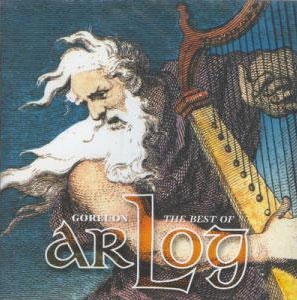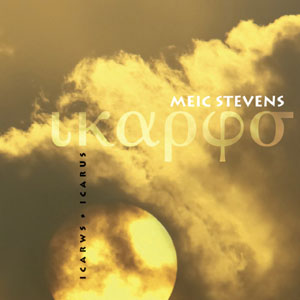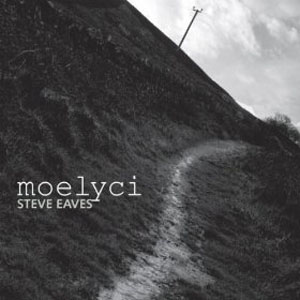The more I am exposed to the various traditions of the world’s art and music, the more I credit Joseph W. Campbell’s observations, from The Flight of the Wild Gander, on the processes of folklore: in spite of the urge to identify “national” traditions, folklore is inevitably the result of cultural cross-fertilization. Thus I can sit in my room and listen to the music of the Balkans or medieval Spain and Portugal and find echoes of Ireland and the Highlands. Of course, I might wonder more about it if I didn’t know that the Celts had occupied Europe from the Black Sea to the Atlantic and from the Mediterranean to the North Sea for centuries, perhaps millennia. The important part is that those influences are still there, working their way up through the later layers from the Middle East and North Africa.This is the sort of thing that ran through my head as I began to listen to three albums by Welsh artists from the Welsh label Sain Records, presented to me as “Welsh music.” What makes them particularly Welsh? I wondered.
 The first, The Best of Ar Log is a two-disc set presenting 41 tracks, one of which I discovered, after finding the translation, is a bonus live track. (No, I could never in a million years have figured out what a “gyda thrac bonws ‘byw’” is on my own.) Ar Log (the name translates as “For Hire,” which led to their being dubbed at one point “Rent A Group” in a context that no one now remembers) was formed in 1976 at the instigation of the Welsh Tourist Board to represent Wales at the Interceltique Festival at Lorient, Brittany. There they met the Dubliners, who listened and persuaded them to stay together and go professional. In the years since, they have become one of the premier folk groups in Wales, with six eponymous releases to their credit. This retrospective was selected from those albums (plus the “gyda thrac bonws“), and marks a 10-year gap since their last recording.
The first, The Best of Ar Log is a two-disc set presenting 41 tracks, one of which I discovered, after finding the translation, is a bonus live track. (No, I could never in a million years have figured out what a “gyda thrac bonws ‘byw’” is on my own.) Ar Log (the name translates as “For Hire,” which led to their being dubbed at one point “Rent A Group” in a context that no one now remembers) was formed in 1976 at the instigation of the Welsh Tourist Board to represent Wales at the Interceltique Festival at Lorient, Brittany. There they met the Dubliners, who listened and persuaded them to stay together and go professional. In the years since, they have become one of the premier folk groups in Wales, with six eponymous releases to their credit. This retrospective was selected from those albums (plus the “gyda thrac bonws“), and marks a 10-year gap since their last recording.
To be perfectly honest, I find very little in this set that marks it as uniquely “Welsh” except for some of the less-energetic pieces such as “Myfanwy” or the hauntingly familiar “Tra Bo Dau,” which do evidence some of what I think of as the Welsh love of — and command of — song. Tunes such as the opening track, “Castell Caernarfon/Pib Ddawns Aberhonddu/LlysWarpool,” on the other hand, could as easily be from Ireland or even the Southern Appalachians as from Wales. (Not that I claim any deep expertise in the differences between the various Celtic musical traditions — I’m sure there are subtleties that I’m missing, but at the same time, I wonder if they’re all that significant.)
Mind you, I don’t count this as a fault. When it comes right down to it, music is music, and we can pat ourselves on the back for having been smart enough to either invent it or borrow it, depending on your degree of species-centricity. In this case, Ar Log deserves the pat; these are superb musicians, turning in performances marked by precision, finesse, and that most rare of qualities, passion.![]()
 Meic Stevens has been called “the Welsh Dylan,” which I find inexpressibly funny for reasons I can’t begin to explain. (I think you had to have lived through the ’60s.) Stevens began performing and recording in English, but left that off after 1967, when he began writing song lyrics and performing in Welsh. On the genesis of this collection, Stevens wrote that he wanted to do something with a rock opera he had written some while back, but when Sain asked for a CD of songs, he started writing.
Meic Stevens has been called “the Welsh Dylan,” which I find inexpressibly funny for reasons I can’t begin to explain. (I think you had to have lived through the ’60s.) Stevens began performing and recording in English, but left that off after 1967, when he began writing song lyrics and performing in Welsh. On the genesis of this collection, Stevens wrote that he wanted to do something with a rock opera he had written some while back, but when Sain asked for a CD of songs, he started writing.
There is a discernible Dylanesque quality to much of the music on Icarus, particularly on songs such as “Digon O Le.” (In fact, listening to that one again, the sense of Bob Dylan is strong enough to be scary.) Don’t be misled by that observation — Stevens’ singing is much more fluent that Dylan’s ever was, and while the influence of the American folk/protest movement of the ’60s is apparent, it is by no means overwhelming. On songs such as “Oes Rhywun Yna?” and “Caru Fi Dim Mwy” there is a strong sense of American country music, moderated by Stevens’ understated style and almost breathy voice. I don’t know if I love this album, but that may be just a personal reaction to the kind of music offered — I can’t fault Stevens’ talent or musicianship, or that of his band, and I have to admit that a track like “Troi Y Cylchau,” which is a real rocker (with some solid and even inspired work by Marcel Batin on electic guitar), undercuts any reservations I might have.![]()
 Steve Eaves is, after hearing Moelyci, to my mind one of Wales’ great treasures. He’s a recognized poet and has been performing as a musician for more than 35 years. He is, perhaps, even more in the mold of the folk/protest movement than Stevens, in everything but music — Eaves’ main influence seems to have been the blues, with a strong leavening of jazz, rock and, yes, even some folk.
Steve Eaves is, after hearing Moelyci, to my mind one of Wales’ great treasures. He’s a recognized poet and has been performing as a musician for more than 35 years. He is, perhaps, even more in the mold of the folk/protest movement than Stevens, in everything but music — Eaves’ main influence seems to have been the blues, with a strong leavening of jazz, rock and, yes, even some folk.
This is one of those albums that leaves me almost speechless. A bald description of the elements of Eaves’ songs isn’t anywhere near adequate. Starting off with “Ymlaen Mae Canaan” and “Gad Iddi Fund,” yes, one can hear the blues and the rock, one can feel the fluent musicality, one can note Eaves’ distinctive vocals — and the man has a wonderful voice, flexible, protean, with an earthy hoarseness at times that weaves past all your defenses — and not come close to the magic he generates, and it’s a magic that holds up through the entire collection. I even adjusted to the idea of blues being sung in Welsh (this, if you can credit it, from a Chicagoan who has spent more than one evening at a blues club in his time). But let’s not belabor the blues or the jazz or the rock — Eaves has made a synthesis of all of this and more (there is some subtle and beautiful fiddle work in the title track, which is itself a haunting tune) and come up with a terrific release. The more I listen, the more impressed I am. Let me mention “Bwgi Rhif 2,” a low-down and dirty R&B masterpiece, delivered in a desperate growl — a real show-stopper.![]()
So, it turns out I’ve not been listening to “Welsh music” so much as music by Welsh artists, and getting a peek at a very lively and energetic music scene (no big surprise there), courtesy of some amazing musicians who have left themselves open to many traditions.
And that, I think, is the way is should be.
(All released by Sain, 2007)
Sain Records is online here, where they are kind enough to offer biographies and discographies of Ar Log and Meic Stevens. Steve Eaves is on MySpace, where you can also enjoy selections from Moelyci just by visiting.


